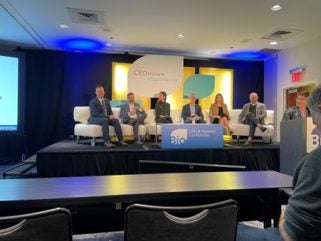Biotechs heed political headwinds for drug pricing negotiations and partnerships
28 Feb 2024

Preview
Source: Pharmaceutical Technology
From left to right: Michael Ward from Alliance for Aging Research, Chris Mancill from BMS, Erin Estey Hertzog from Foley Hoag, Rick Weissenstein from Washington Research Group, and Lindsay Androski from Roivant. Credit: Justine Ra/GlobalData
The extended reach of US government and international relations is leaving biotechs with the challenge of navigating the everchanging waters of drug policy, experts said at the 2024 BIO CEO & Investor Conference in New York.
One of the biggest stories from a drug policy and pricing perspective remains the Inflation Reduction Act, which was a major focal point at a panel on understanding pricing and access to medicines during an election year, which was held on 27 February.
IRA drug negotiations are inherently political, given that 2024 is an election year and the negotiated drug prices are meant to be public in September, says Erin Estey Hertzog, partner of the New York-based law firm Foley Hoag. The manufacturers of the first 10 drugs targeted for price negotiation have already received an initial offer, she explained. If the companies do not come to agreement on price, then they will incur a hefty tax.
Lindsay Androski, CEO of Roivant Social Ventures, said the IRA and other similar efforts undermine industry patents. She went on say that biotechs are currently under pressure from the Bayh-Dole Act, which allows the government to exercise “march in rights” to take over a license in certain circumstances like if the drug is based on taxpayer-funded research that is inaccessible to the public.
Another aspect that has lately been in the news is the collaboration with foreign biotech companies, particularly from China. A few weeks ago, it was announced that a bipartisan group of lawmakers are actively pursuing a formal investigation and sanctions against WuXi given the company’s alleged connections to the Chinese military.
See Also:Jiangsu Hengrui Medicine files patent for combination drug for preventing nausea and vomiting

Preview
Source: Pharmaceutical Technology
Orexo files patent for pharmaceutical composition for transmucosal drug delivery

Preview
Source: Pharmaceutical Technology
Bills—that will likely gain bipartisan support—that restrict companies from using US money to work with Chinese operations, namely manufacturers BGI and WuXi, said Rick Weissenstein, the Managing Director of Washington Research Group.
“The lens they’re [the US government] looking through is if China went to Taiwan and we went in to support them, what could the Chinese government do? What could they shut down? And the answer is a lot,” Weissenstein explained. The impact of US-China relations on the biotech industry is here to stay; and this makes it necessary to actively consider where companies will turn to for manufacturing to avoid manufacturing atrophy, he elaborated.
For more details,please visit the original website
The content of the article does not represent any opinions of Synapse and its affiliated companies. If there is any copyright infringement or error, please contact us, and we will deal with it within 24 hours.
Targets
-Drugs
-Hot reports
Get started for free today!
Accelerate Strategic R&D decision making with Synapse, PatSnap’s AI-powered Connected Innovation Intelligence Platform Built for Life Sciences Professionals.
Start your data trial now!
Synapse data is also accessible to external entities via APIs or data packages. Leverages most recent intelligence information, enabling fullest potential.




